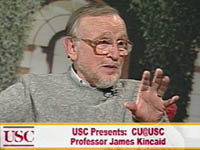One of our staff members is contributing considerably to a News Archiving service at Mu. Any well educated (Masters, PhD or above) users who wish to make comments on news sites, please contact Jim Burton directly rather than using this list, and we can work on maximising view count.
James Kincaid

James R. Kincaid is currently Aerol Arnold Chair in English and Professor of English at the University of South Carolina, where he has been teaching since 1987.
Kincaid is interested in the media's portrayal of childhood 'innocence' and sexuality, and more particularly with our culture's investment in perpetuating, exploiting and fetishizing the myth of the 'innocent child'.
A social critic, Kincaid's most infamous creation is perhaps the notion of 'Erotic Innocence' – the idea that children in our culture are eroticized through emphatic de-eroticization. 'Innocence', he suggests, is a rhetorical category; its disavowals, self-justifications and recriminations mark the traces of a violent disidentification with children that constructs childhood by voiding it of content.
Kincaid rejects most stereotypes of childhood and pedophilia. He describes the "utopian and revolutionary" aim of his book Child-Loving: The Erotic Child and Victorian Culture (New York: Routledge, 1992) as being the repositioning of sexual attitudes toward children, who are assaulted by societal protections. He advances "a form of sexual thinking that abandons fixed categories in favor of a scale of dynamic and relativistic measure of a shifting range of possibilities".
Controversy
When Kincaid's book Child-Loving was published in the UK, an article in the Sunday Times newspaper stated (erroneously) that "Kincaid's theories support those of the infamous Paedophile Information Exchange", banned in Britain. At least three Conservative MPs called for the book to be banned (Lord Bernard Braine "simply couldn't believe" that "a reputable publisher could consider printing a book with such views"; Ann Winterton MP was "appalled"; while Dame Jill Knight opined that it was "crucial for the normal development of children that their innocence be preserved"). Meanwhile, Michael Hames, head of Scotland Yard's Obscene Publications Squad, told the Daily Mail newspaper that people would be "rightly outraged" by the book, which "give[s] comfort to paedophiles".
As usual, its doubtful that any of those quoted actually read the text; or that even if they had, would have been capable of understanding it. In fact, Kincaid is very careful not to present any argument in favor of "pedophilia", partly because he recognizes the speciousness of arguments from morality, and partly because the category itself is a socially-constructed one. He mentions in Child-Loving that his analysis "does not, of course, naturalize pedophilia, much less justify it. But it does suggest that our resistance to child-love helps ensure the perpetuation of the activity."
It might be said that Kincaid is not so much interested in actual manifestations of cross-generational intimacy, but rather in the discursive construction of 'the child' and 'child sexuality' that are produced by the stories we tell ourselves. For instance, he observes, with regard to typical arguments focusing on so-called 'power inequalities' involved in intergenerational intimacy, that "the question is not the redistribution of power but its adequacy in the first place, its limitations as a tool for understanding and for living".
Our own article summarises Kincaid's work.
Key texts
- Child-Loving: The Erotic Child and Victorian Culture (New York: Routledge, 1992)
- Erotic Innocence: The Culture of Child Molesting (Duke University Press, 1998)
External links
- Is this Child Pornography? - For Salon
